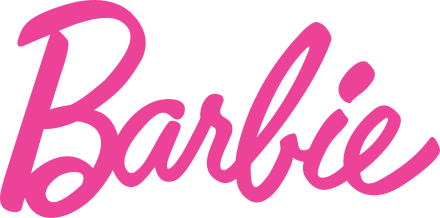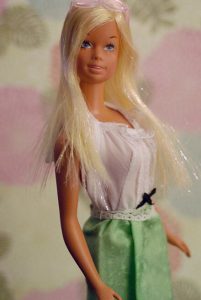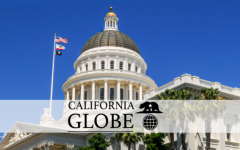
Original Barbie Logo. (Photo: public domain)
Barbie: A Satire of Progressivism and Collectivism
Gerwig had free rein to create her own world with her own rules
By J. Mitchell Sances, August 5, 2023 7:31 am
**WARNING: THIS ARTICLE CONTAINS SPOILERS**
It is quite possible that Greta Gerwig has written and directed a perfectly people-pleasing film in Barbie. She ingeniously placates the progressive left with benchmarks of inclusivity while taking all of it so over the top that conservative-leaning movie goers detect the satire and hyperbole immediately, at least the more intelligent ones—looking at you Ben Shapiro.
As the film opens, we are introduced to Barbieland, a magical place where everyone and everything is perfect. While most would think that the Barbies would resemble Stepford Wives—WASPy waifs with pearls and perfectly coiffed hair—we see a veritable Benetton ad of every color, size, and shape of Barbie imaginable.

For example, there was a fat Barbie, a character that has tugged at the heart strings of some of the most ridiculous “journalists” out there. In an op-ed for Metro entitled “Barbie may have a fantastically diverse cast – but we need an actual fat doll in real life,” Emmie Harrison-West wrote, “[W]hat I’ve been the most excited for is Lawyer Barbie – played by plus-sized icon, Sharon Rooney. She’s celebrated by the little girl in me that had no Barbies that looked like her. Rooney is proof that we need a plus-sized Barbie doll. That we needed it a long, long time ago.”
Now a “plus-sized” Barbie character that does not pay homage to any actual toy created by Mattel could obviously be written off as placating inclusivity, which clearly worked for some, but the true moment of satire came with the brief cameo of a Barbie in a wheelchair attempting to perform perfectly a choreographed dance routine. Even the utmost progressive of southern California audiences chuckled at the absurd and slightly insensitive moment. While this character is a reference to an actual doll that was once produced, by incorporating her into that particular scene, Gerwig flew right past inclusivity and into satire territory.
The toy Barbie has no true backstory or lore to accompany her, meaning Gerwig had free rein to create her own world with her own rules. Naturally, one of the film’s central themes was feminism. In Barbieworld, women rule and run everything. Men are dumb hunks of meat—or plastic as the case may be—who have no real jobs; they stand around and “beach” all day. I am not sure if Gerwig meant that as a tongue-in-cheek reference to a very similar sounding word of what a man might say that a woman does all day, but I am going to assume that she did.
As the plot progresses, Barbie finds herself falling prey to imperfections. She loses the signature stiletto curve to her feet, she gets cellulite, and she has thoughts of death. In order to fix the problem, she must travel to the real world and find whoever is playing with her. Barbie and a stowaway Ken find themselves in a Los Angeles high school. When Barbie confronts the teenage girl she believes to be her owner, the moody, extremely progressive Gen-Zer proclaims that Barbies single-handedly set feminism back decades and then calls Barbie a “fascist.” Here Gerwig is clearly satirizing the ultra-progressive generation that has no understanding of history or semantics and instead throw buzzwords and labels at anyone they deem an annoyance. The absurdity of the tirade elicited a chuckle from me, but the rest of the audience either did not understand or did not appreciate the joke at their expense.
As Ken realizes that men in the real world have some sense of authority and autonomy unlike in Barbieland, he decides to do some research. He checks out some books on patriarchy from the library. It appears the books he is seen holding in the film do not actually exist, but we can assume from the subsequent events of the plot that these would have been penned by progressives seeking to paint males as stupid, arrogant misogynists. When Ken returns to Barbieland, he convinces the other Kens to take over, and the once all-powerful Barbies seem to acquiesce readily, plunging their world into machismo-filled chaos.
It turns out that the rude Gen-Z high schooler is not in fact the one who messed up Barbie, but it was actually her mother. The pair return with Barbie to Barbieworld to view what Ken has turned it into, prompting the mother (played by America Ferrera) to deliver an impassioned and realistic speech of what it means to be a woman in the real world. Despite not being a woman myself, I had to suppress the urge to clap and shout “Amen!” in the theater. As I sat there, it dawned on me that the people in the extreme gender ideology cult who can’t even define the word “woman” should take offense to much of what is being portrayed on the screen. But Gerwig’s genius preemptively squashed those grievances by including a shiny new trans Barbie, played by Hari Nef, to distract them.
As the film concludes, the Barbies were able to win back control of Barbieland, but the Kens languished at losing their autonomy. In the end, the dolls decided that it was their differences and individuality that should be celebrated and embraced, not solely belonging to one group battling between patriarchy and matriarchy. Demonizing collectivism in favor of individualism is a quintessentially conservative and libertarian viewpoint. Any progressive that enjoyed the message and theme of this film who also champions identity politics is an outright hypocrite.
Barbie is a chaotically fun wild ride with a great message, and Greta Gerwig should be lauded for creating a world and a story that has appeal to everyone. With original songs and masterfully choreographed dance interludes that are reminiscent of White Christmas, Barbie is a modern day masterpiece and classic.
- Shifty Schiff Resurrects Russia Collusion Hoax - August 21, 2024
- AB 1955 Causes Elon Musk to Pull Out of California - August 5, 2024
- Chino Valley Unified Sues California over Erosion of Parental Rights - July 26, 2024





From what we’ve heard, the movie “Barbie” that it’s filled with extreme woke feminism? It’s doubtful that Greta Gerwig, who grew up in Sacramento surrounded leftist Democrats and now lives in Manhattan surrounded by leftist Democrats, wrote the movie as satire and hyperbole of the “progressive” left? We won’t waste our money or time to go see it or any of the other woke movies that Hollywood studios churn out.
TJ – I am not buying the author’s reasoning either. Mitchell’s arguments are compelling but I am not convinced that his take is what the author/director/producer wanted to create. It is similar to writing that Clockwork Orange was so over the top with violence that it was actually a satire on violence.
“Liberalism” has become so extreme it is a parody of itself. Liberals lack any vestige of
self-awareness so they never see it.
Barbie, the film, was well played.
when Barbie was first sold in 1958, I was 10 and I never wanted her.
I was more interested in Tiny Tears doll. she came out in 50’s too, she cried tears and wet her diaper. She did stuff. Barbie was statue like.
IThe beginning of the movie when the little girls smash their dolls, opting for Barbie remniscent 2001 Space Odyssey . 2001 Space Odyssey, The Dawn of Man.
The Journey begins for…possibly, self actualization and all that means for both male and female.